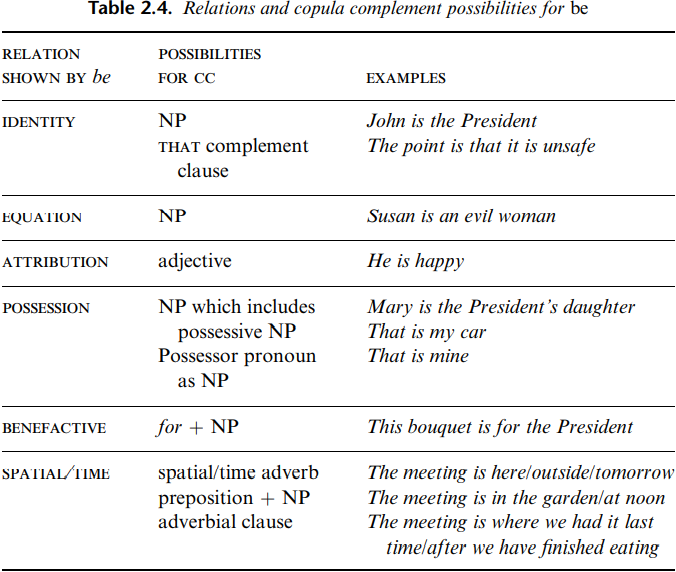

Grammar


Tenses


Present

Present Simple

Present Continuous

Present Perfect

Present Perfect Continuous


Past

Past Simple

Past Continuous

Past Perfect

Past Perfect Continuous


Future

Future Simple

Future Continuous

Future Perfect

Future Perfect Continuous


Parts Of Speech


Nouns

Countable and uncountable nouns

Verbal nouns

Singular and Plural nouns

Proper nouns

Nouns gender

Nouns definition

Concrete nouns

Abstract nouns

Common nouns

Collective nouns

Definition Of Nouns

Animate and Inanimate nouns

Nouns


Verbs

Stative and dynamic verbs

Finite and nonfinite verbs

To be verbs

Transitive and intransitive verbs

Auxiliary verbs

Modal verbs

Regular and irregular verbs

Action verbs

Verbs


Adverbs

Relative adverbs

Interrogative adverbs

Adverbs of time

Adverbs of place

Adverbs of reason

Adverbs of quantity

Adverbs of manner

Adverbs of frequency

Adverbs of affirmation

Adverbs


Adjectives

Quantitative adjective

Proper adjective

Possessive adjective

Numeral adjective

Interrogative adjective

Distributive adjective

Descriptive adjective

Demonstrative adjective


Pronouns

Subject pronoun

Relative pronoun

Reflexive pronoun

Reciprocal pronoun

Possessive pronoun

Personal pronoun

Interrogative pronoun

Indefinite pronoun

Emphatic pronoun

Distributive pronoun

Demonstrative pronoun

Pronouns


Pre Position


Preposition by function

Time preposition

Reason preposition

Possession preposition

Place preposition

Phrases preposition

Origin preposition

Measure preposition

Direction preposition

Contrast preposition

Agent preposition


Preposition by construction

Simple preposition

Phrase preposition

Double preposition

Compound preposition

prepositions


Conjunctions

Subordinating conjunction

Correlative conjunction

Coordinating conjunction

Conjunctive adverbs

conjunctions


Interjections

Express calling interjection

Phrases

Sentences


Grammar Rules

Passive and Active

Preference

Requests and offers

wishes

Be used to

Some and any

Could have done

Describing people

Giving advices

Possession

Comparative and superlative

Giving Reason

Making Suggestions

Apologizing

Forming questions

Since and for

Directions

Obligation

Adverbials

invitation

Articles

Imaginary condition

Zero conditional

First conditional

Second conditional

Third conditional

Reported speech

Demonstratives

Determiners


Linguistics

Phonetics

Phonology

Linguistics fields

Syntax

Morphology

Semantics

pragmatics

History

Writing

Grammar

Phonetics and Phonology

Semiotics


Reading Comprehension

Elementary

Intermediate

Advanced


Teaching Methods

Teaching Strategies

Assessment
Main clauses
المؤلف:
R.M.W. Dixon
المصدر:
A Semantic approach to English grammar
الجزء والصفحة:
27-2
2023-03-10
1745
Main clauses
Each main clause has an ‘argument governor’ (which is the predicate) and one or more ‘arguments’, which are in grammatical relationship to the governor. English has three varieties of main clause, as shown in Table 2.3.
In each clause type, the predicate is a verb phrase and each argument is a noun phrase. As the term ‘predicate’ is used here, it does not include an NP. For example, in John will be interviewing Mary, the predicate is will be interviewing (not will be interviewing Mary); and in Mary was a good dancer the predicate is simply was (not was a good dancer).


All NPs have reference to a concrete or abstract entity (for example, the tall woman or sincerity), and all transitive and intransitive VCs have reference to a concrete or abstract activity or state (for example, fall or kick or like). In contrast, a copula expresses a relation between the CS and CC arguments. And whereas A, O, S and CS are realized by NPs with essentially the same structure, the possibilities for CC are somewhat different. By far the most common copula in English is be; the possibilities for its CC are set out in Table 2.4.
Many languages require a verb of rest or motion to be included with a locational expression, saying something like She is staying in Prague or She is going to Vienna. English can use just the copula to describe a position of rest, e.g. She is in Prague; but a verb of motion must normally be included with any specification of motion ‘to’ or ‘from’—that is, going cannot be omitted from She is going to Prague. There is an interesting exception: the ‘previous’ auxiliary have plus copula be can be used with a to phrase, without a verb of motion, e.g. She has been to Prague (with the meaning ‘she went to Prague at least once’).
The other copula verbs in English include become, which can be followed by (i) an NP, or (ii) an adjective (She became a doctor/my wife/sick) and get, come, go, grow, turn, feel, each of which may only be followed by a restricted set of adjectives, e.g. get dirty, come true, go bad, grow stupid, turn green. Whereas become only functions as a copula and be only as copula and in the imperfective and passive auxiliaries, the other five also have non-copula uses; indeed, their lexical and copula uses can merge— compare He turned/grew sad with He turned/grew into a sad man.
A main clause in English generally includes a subject, which precedes the predicate. Intransitive verbs have a single core role and this must be intransitive subject (referred to as ‘S’ relation). Transitive verbs have two or more core roles, and that role which is most likely to be relevant for the success of the activity is in transitive subject relation (referred to as ‘A’).
A transitive verb must also have a role in object (O) relation, and this will immediately follow the predicate. After an intransitive predicate, or a transitive-predicate-plus-object or a copula-predicate-plus-copula complement, a clause may include one or more peripheral NPs (each introduced by a preposition), referring to recipient (give the book to Mary), or beneficiary (take the book for Mary), or instrument (shave with a razor), or reason (do it for money/kicks) etc.; and also one or more spatial or time or frequency or manner expressions .
 الاكثر قراءة في Semantics
الاكثر قراءة في Semantics
 اخر الاخبار
اخر الاخبار
اخبار العتبة العباسية المقدسة

الآخبار الصحية















 قسم الشؤون الفكرية يصدر كتاباً يوثق تاريخ السدانة في العتبة العباسية المقدسة
قسم الشؤون الفكرية يصدر كتاباً يوثق تاريخ السدانة في العتبة العباسية المقدسة "المهمة".. إصدار قصصي يوثّق القصص الفائزة في مسابقة فتوى الدفاع المقدسة للقصة القصيرة
"المهمة".. إصدار قصصي يوثّق القصص الفائزة في مسابقة فتوى الدفاع المقدسة للقصة القصيرة (نوافذ).. إصدار أدبي يوثق القصص الفائزة في مسابقة الإمام العسكري (عليه السلام)
(نوافذ).. إصدار أدبي يوثق القصص الفائزة في مسابقة الإمام العسكري (عليه السلام)


















